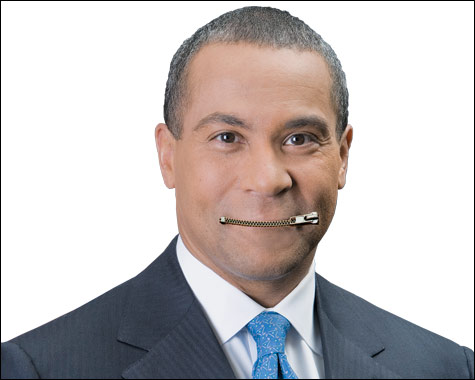 |
Masochistic messenger
After a flurry of early-term gaffes, Deval Patrick seemed to regain his communications equilibrium — and then came BookGate. Here’s a timeline: NOVEMBER 2006 Scolds the Massachusetts Newspaper Publishers Association for missing the essence of his campaign. FEBRUARY 2007 A busy month: Patrick makes headlines for redecorating his office (with, among other things, a $12,000 set of drapes); upgrading the governor’s car to a Cadillac DeVille (Mitt Romney used a Ford Crown Victoria); hiring his former fundraising committee co-chair as a scheduler for his wife, Diane (for $72,000 annually); and, most damaging, phoning Citigroup on behalf of ACC Capital Holdings, parent company of subprime lender Ameriquest (Patrick is a former ACC board member). MARCH 2007 Amy Gorin, Diane Patrick’s scheduler, resigns. Joe Landolfi, a veteran State House press hand, takes over communications operations from novice communications director Nancy Fernandez Mills. APRIL 2007 Joan Wallace-Benjamin resigns as Patrick’s chief of staff; she’s replaced by former Patrick chief campaign strategist Doug Rubin. MARCH 2008 Patrick travels to New York to pursue a book deal immediately before the Massachusetts House of Representatives kills his casino proposal. Rubin subsequently apologizes on Patrick’s behalf; Patrick insists he did nothing wrong. |
You campaign in poetry, Mario Cuomo famously claimed, but you govern in prose. Don’t buy the dichotomy. After all, whether they’re running for office or exercising power, politicians face much the same imperative: speak and act in a way that inspires supporters, befuddles and demoralizes detractors, and convinces everyone else to join the first group and not the second. Do this, and you’ll succeed; don’t, and you’ll fail.Consider, for example, the strangely bifurcated career of Massachusetts Governor Deval Patrick. As a candidate, Patrick distinguished himself as a remarkably gifted political communicator. In intimate settings, he radiated intelligence, attentiveness, and empathy; in mass gatherings, he had a gift for stirring oratory and a knack for making people feel like part of a movement that transcended mere politics.
Since winning election, though, the formerly sure-footed Patrick has been strangely maladroit. Even before his inauguration, for example, he needlessly antagonized the press in a combative speech to the Massachusetts Newspaper Publishers Association (MNPA), terminating whatever honeymoon he might have enjoyed.
Most recently, late this past month, Patrick made a huge political blunder when he traveled to New York to pursue a book deal just hours before the Massachusetts House of Representatives killed his pet proposal to legalize casino gambling. At first, Patrick kept quiet about his trip; his schedule said only that he was out of town on personal business. Then, after WBZ-TV’s Jon Keller reported what that personal business had been, the governor defended himself by noting that the outcome of the House vote had been a foregone conclusion.
This was true — yet it totally missed the larger point. By heading to New York when he did, Patrick missed an opportunity to frame the defeat in a politically advantageous way — for example, by accusing his political nemesis, House Speaker Sal DiMasi, of refusing to address the need for new state-revenue sources. In addition, Patrick invited speculation about his dedication to the governor’s job, the size of his ego, and his overall political acumen. Two weeks later, a new Survey USA-WBZ poll showed Patrick’s ratings reaching a new low, with just 41 percent of respondents saying they approved of his performance and 49 percent saying they didn’t.